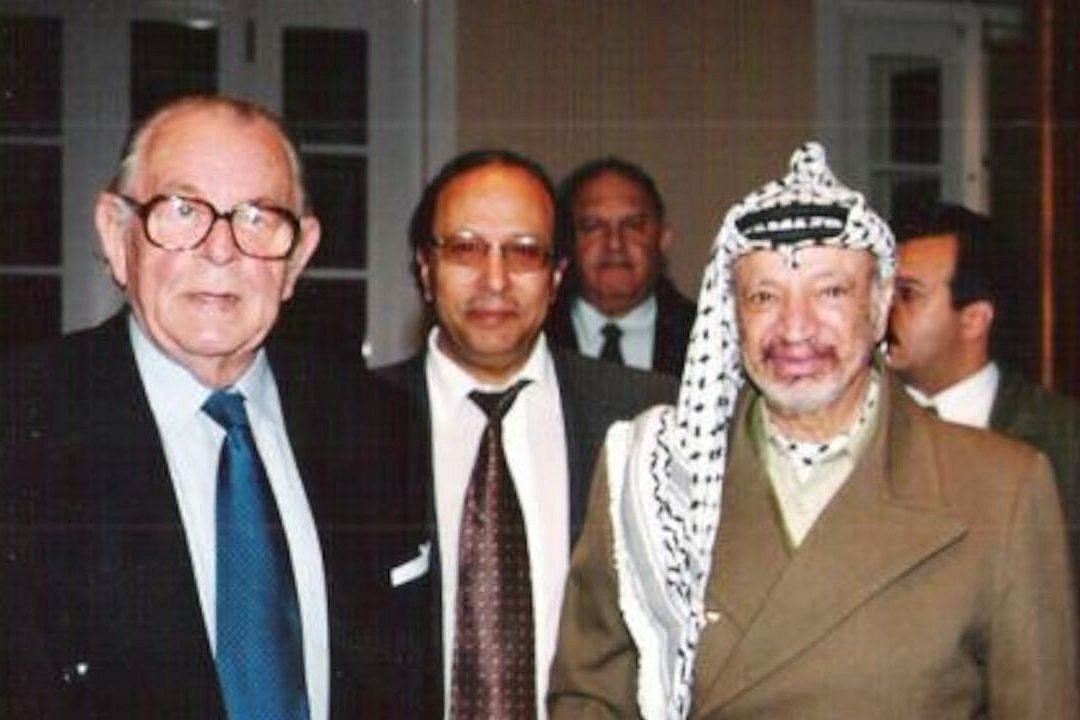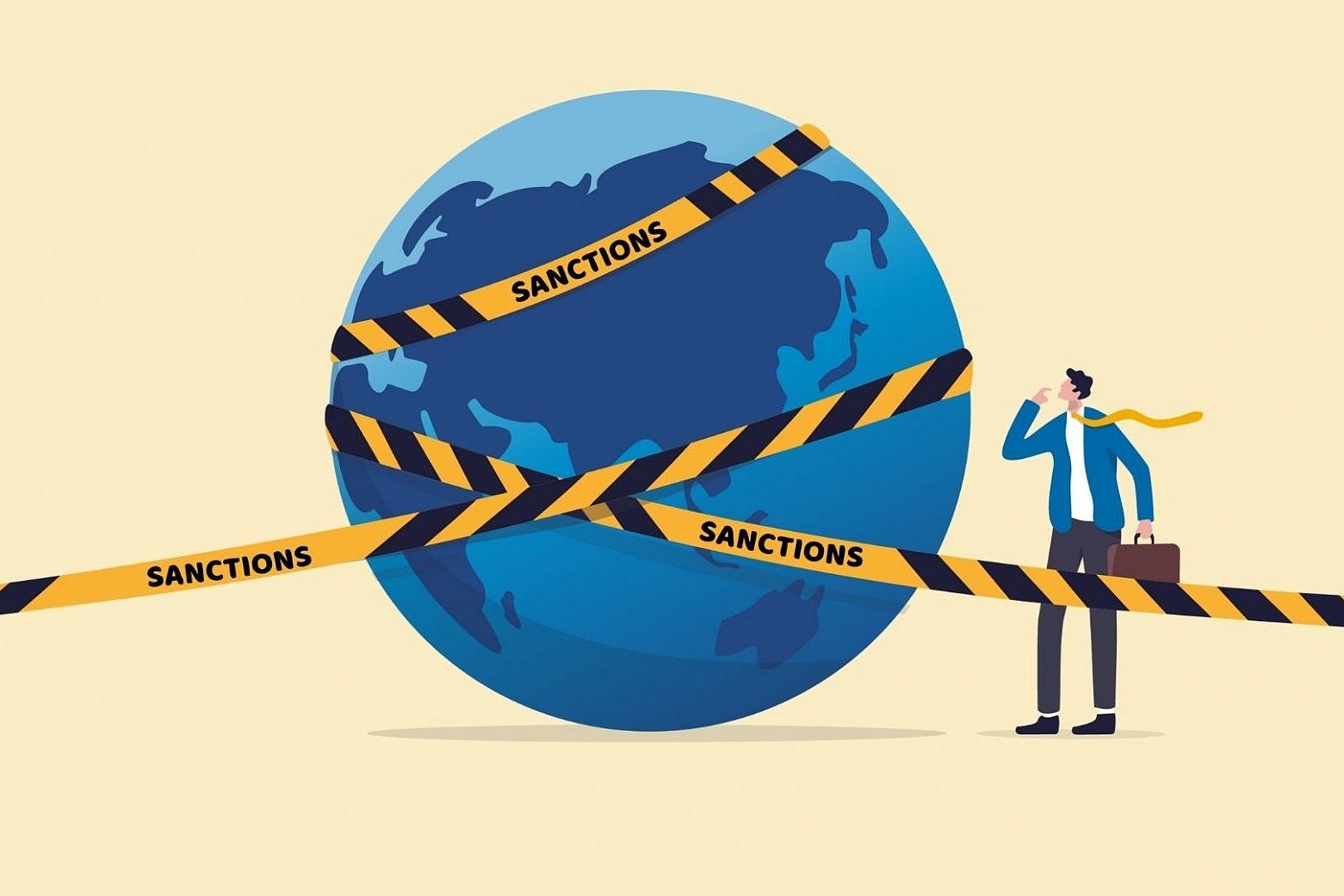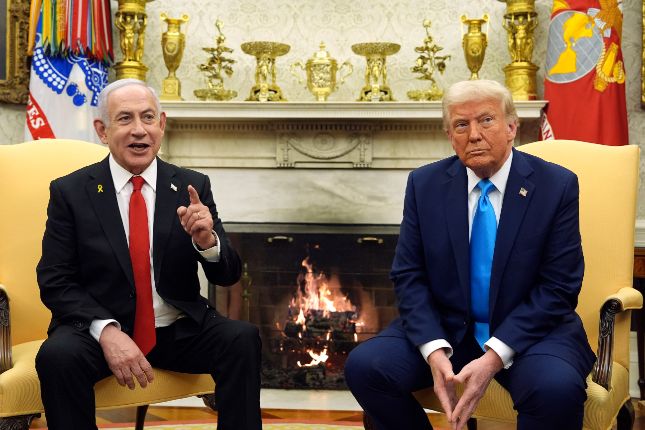Nevertheless, the German government stands steadfastly behind the Israeli government, surpassed in this only by the Trump administration.
In the face of growing outrage, Berlin’s official position has shifted slightly. In mid-June, Chancellor Friedrich Merz had attested that the Zionist state was “doing the dirty work for all of us;” now he urges greater humanitarian consideration and will no longer approve weapons for use in Gaza. Yet, in practical terms, nothing has changed. Germany continues to support Israel politically and militarily, opposes all sanctions, and prosecutes opponents of the genocide as alleged “antisemites.”
This is supposedly justified by Germany’s special responsibility for the Holocaust. In 2008, Chancellor Angela Merkel declared Israel’s security to be a German “Staatsräson” (matter of state policy), the same formulation found in the current government’s coalition agreement. Three months ago, in a speech marking the 60th anniversary of the establishment of diplomatic relations, Federal President Frank-Walter Steinmeier celebrated the “miracle of reconciliation after the civilizational rupture of the Shoah.” At that time, Israeli Prime Minister Benjamin Netanyahu had long been sought on an international arrest warrant for crimes against humanity.
To justify the Israeli army’s war crimes by citing reparations for the Shoah is disgusting and repulsive. Responsibility for the genocide of the Jews does not obligate Germany to support another genocide. Historically, this justification is based on a myth devoid of any factual basis.
The close collaboration between Germany and Israel never had anything to do with “reparations,” atonement for the Shoah, or anything comparable. It was a reciprocal deal: Germany supplied the beleaguered Zionist state with weapons, economic aid and financial assistance; in return, the Israeli government turned a blind eye to the continued presence of Nazi elites in the state and economy of the Federal Republic of Germany and helped it gain international standing.
This connection is vividly documented in the book “Absolution?: Israel und die deutsche Staatsräson” (“Absolution? Israel and German State Policy”) by Daniel Marwecki. The political scientist, born in Bremen in 1987, evaluated files from the archives of the German Foreign Ministry in Berlin—some of which were accessible for the first time—as well as from Israeli archives and numerous other sources.
Published in 2024, the book was written before the most recent war in Gaza. It is based on the doctoral thesis Marwecki submitted in 2018 at the School of Oriental and African Studies (SOAS), University of London, which was published in English under the title “Germany and Israel: Whitewashing and Statebuilding.” For the German edition, the text was revised and supplemented with an updated afterword.
The Luxembourg Agreement of 1952: Economic Aid for Political Absolution
The close cooperation between Germany and Israel began long before the official establishment of diplomatic relations in 1965. As early as 1952—when Israel was just four and the Federal Republic three years old—the two states negotiated a so-called “reparations agreement” in Luxembourg after lengthy talks.
The previous year, Konrad Adenauer’s (Christian Democrat, CDU) government had passed the so-called “131 Law,” which secured the return of numerous former Nazis to the civil service and gave them access to public pensions. As Marwecki demonstrates, the law and the agreement were closely linked:
From a post-war German perspective, the compensation policy towards Israel and the reintegration of old Nazis into the not-so-new Germany were hardly contradictory. Reparation and reintegration were, in fact, complementary. The former made the latter possible.
The fiercely contested agreement brought Israel urgently needed capital goods, energy supplies and soon, weapons. The relatively small sum of 3.45 billion Deutsche Marks (DM), which Germany committed to as reparations, was paid two-thirds in the form of goods. The final third was used to pay for crude oil deliveries from British energy companies. Individual compensation for victims of the Holocaust, however, was not included.
For Israel, which was still highly isolated internationally at the time, the agreement was “vital,” according to Marwecki. Until 1965, about three times as much capital flowed from Germany to Israel as from the US, which only became the Zionist state’s main supporter after the Six-Day War of 1967.
Germany supplied machinery for the textile, chemical, engineering and other industries, as well as for road construction, agriculture and much more. The largest single sector was shipbuilding, with 60 ships and a total tonnage of around 450,000. German deliveries initially accounted for 12 percent of all Israeli imports. Germany thus helped “transform an import-dependent agrarian state into an export-oriented industrial state” capable of absorbing the growing number of immigrants.
For Germany, the agreement was, according to Marwecki, “a cost-effective investment in its international rehabilitation.” The supposed “reparations” helped the Federal Republic gain international standing, while former Nazis, some of whom were responsible for capital crimes, continued to occupy high government offices, judicial posts, university chairs and corporate boardrooms. Hans Globke, the chief of staff and “grey eminence” in Konrad Adenauer’s chancellery, had been a co-author and commentator of the Nuremberg Race Laws.
Germany also benefited economically and—as we shall see—militarily from the agreement. Today, after the US and China, it is still Israel’s third-largest trading partner.
Marwecki shows in detail that the Luxembourg Agreement was not accompanied by an acknowledgement of or coming to terms with the Nazi crimes. It served to prevent such a reckoning. Antisemitic prejudices remained widespread even years later, reaching into the highest circles of government.
The Luxembourg Agreement was controversial not only in Israel but also in Germany. Among its most important opponents were Adenauer’s financial advisor Hermann Josef Abs and Finance Minister Fritz Schäffer. They opposed it on grounds of cost. Under the Nazis, Abs had risen to the top leadership of Deutsche Bank. As a board member, he was responsible for “Aryanization” measures and sat on the supervisory board of I.G. Farben, which operated factories in Auschwitz and produced the deadly Zyklon B for the gas chambers. In 1957, twelve years after the end of the Nazi regime, Abs became CEO of Deutsche Bank and rose to become the dominant figure in the German economy.
The decisive factor for approving the Luxembourg Agreement ultimately came from Economics Minister and later Chancellor Ludwig Erhard (CDU), who highlighted its economic and political benefits in a letter to Adenauer:
In a more dynamic assessment of the [economic] development and especially from a political perspective, it could... very well be that a higher admission of debt would in the final analysis better serve German interests, namely if we strengthen German creditworthiness and finally perhaps even reconcile the Jews of the world with Germany’s past.
The antisemitic allusion to “the Jews of the world” was no accident. Adenauer also made similar statements repeatedly. Even after the Holocaust, Germany’s political leadership still believed in a Jewish world conspiracy. Even when Germany and Israel officially established diplomatic relations in 1965, the first German ambassador to Tel Aviv, Rolf Pauls, justified it in an internal letter by citing the influence of “world Jewry:”
It should be noted that Israel and the Jews exert decisive influence at the crucial global centres of public opinion formation and will be of great importance for our good will, especially concerning world public opinion on the German Question, in the difficult foreign policy times that lie ahead. The attitude of world Jewry to the German Question, which cannot be separated from the quality of German-Israeli relations, will, in my conviction, carry more weight for the future of this most important of our political goals than the... attitude of the Arab states. (110)
The “German Question” was the focus of German foreign policy at the time. The Adenauer government demanded the restoration of Germany within its 1937 borders, including the then state of East Germany (GDR) and large territories that Germany had been forced to cede to Poland, Czechoslovakia and the Soviet Union after its defeat in the war. This only changed in 1970, when Willy Brandt’s government officially recognized Poland’s western border for the first time.
The true character of German-Israeli relations became particularly clear during the Eichmann trial. When Adolf Eichmann, who had played a central role in the persecution, deportation and murder of six million Jews, was abducted from Argentina by the Israeli secret service and put on trial in Israel in 1961, alarm bells rang in Bonn. The German government feared that Eichmann might talk and incriminate high-ranking officials—especially Chancellery Chief of Staff Globke.
The Federal Intelligence Service (BND), which was riddled with old Nazis, sent several “observers” to Jerusalem to influence the trial and control reporting on it. Promised weapons and financial aid were withheld until Eichmann was executed in the summer of 1962. Eichmann himself kept his mouth shut. The fanatical Nazi and Jew-hater had no interest in denouncing old comrades. He knew he could not escape the death penalty and steadfastly played the farce of the “banality of evil”—the apolitical and emotionless recipient of orders.
Military cooperation
Even more important than the economic cooperation was the military collaboration between Germany and Israel. It began even before the Luxembourg Agreement of 1952. As early as 1948, the underground army Haganah was in contact with German military representatives, and in 1951, the Israeli Ministry of Defence went on a shopping tour in Germany.
Before the Six-Day War of 1967, Germany played a more important role than the US in providing military support to Israel. “Israel first became a regional power with German help—and only after it became a regional power did the US take on the role of patron of the Jewish state,” writes Marwecki.
The driving force behind this cooperation was Defence Minister Franz Josef Strauß. The long-time chairman of the CDU’s Bavarian sister party, the Christian Social Union (CSU) stood on the right wing of German politics and strictly rejected any reckoning with the Nazi past. He had abstained from the parliamentary vote on the Luxembourg Agreement. But when he became defence minister in 1956, he changed his mind: “For him, Israel became a bastion of the West in the Middle East, a military guarantor against Soviet influence and Arab nationalism.”
The military cooperation led to tensions with the Foreign Ministry, which feared that Arab states would establish diplomatic relations with the GDR if the arms deliveries became public. According to the Hallstein Doctrine then in force, the Federal Republic would have had to immediately break off relations with these states.
This would not only have had unforeseeable consequences “for the position and reputation of the Federal Republic in the Middle East,” as Foreign Minister Heinrich von Brentano wrote to Strauß in 1958. It would also have endangered Germany’s energy supply, which was increasingly dependent on oil from the Middle East. The military cooperation therefore took place largely in secret but was all the more intensive for it.
In 1957, Shimon Peres, then Deputy Israeli Defence Minister, secretly visited Strauß at his private home in Bavaria. “Only a few months after our meeting, the Israeli army received very valuable equipment,” Peres later reported. “We received ammunition, training equipment, helicopters, spare parts, and much more. The quality was excellent, and the quantity was considerable.”
That was only the beginning. In August 1962, two months after Eichmann’s execution, the German government approved a huge arms delivery. It included 114 anti-aircraft guns, 24 Sikorsky helicopters, 12 Noratlas transport aircraft, six Jaguar fast patrol boats, and four Dornier-28 aircraft.
Military cooperation, too, was not about reparations but about German imperialist interests. Israel served the Federal Republic as a bridgehead in the Middle East. The briefing folder for the first German ambassador to Tel Aviv, Rolf Pauls, stated:
As a bridge to Africa and the Indian Ocean, as a line of communication for Europe to the centres of tension in East Asia, and as an important source of oil, the Middle East is of considerable strategic importance, and maintaining stability in this region is a crucial concern for the West.
Not least, it was about pushing back the influence of the Soviet Union. Pauls was aware of this, writing:
Our interest in consolidating the economic and political state of Israel as a factor of the free world in the Middle East is undeniable.
The—largely secret—security cooperation with Israel continues to this day. It is of great importance not only for Israel but also for the Bundeswehr (Armed Forces) and the German arms industry. It “encompasses research, development, training, and joint military exercises,” writes Marwecki. It is “as intertwined in the military, armaments policy, and intelligence spheres as that between NATO states.”
Germany not only supplies weapons to Israel but also buys them from Israeli production. For instance, the Israeli Uzi served as the standard submachine gun for the early Bundeswehr. After the 1973 war, Israel handed over captured Soviet T-62 tanks. They enabled Germany to develop a new cannon for the Leopard 2 that could penetrate the state-of-the-art Soviet tank. The Israeli Merkava 3 tank, in turn, is based on the model of the German Leopard 2. The latest model, Merkava IV, is powered by German MTU engines.
Building the Israeli atomic bomb
Perhaps the most important—and most secret—area of military cooperation concerns the Israeli atomic bomb. It is considered certain that Israel possesses at least 90 nuclear warheads, although it has never officially admitted this, making it the only nuclear power in the Middle East. There are numerous indications that Germany—a non-nuclear state—was involved in the development or at least the financing of the Israeli atomic bomb.
Marwecki mentions a special payment of 2 billion DM that Germany granted Israel in May 1961. Due to “the size of the sum and in view of foreign policy sensitivities, confidentiality was agreed upon.” Hans Rühle, who held high-ranking positions in the Ministry of Defence and NATO at the time, is convinced that these funds went into financing the Israeli nuclear program. In 2015, he wrote in Die Welt that the reactor complex in the desert city of Dimona, in whose construction France participated, was financed by Germany. The files refer to the financing of a—never built—”textile factory” and a “nuclear desalination plant.” The term “textile factory” was often used in Israel as a codename for nuclear facilities.
Whether Germany also collaborated technically with Israel on the development of the atomic bomb is not proven. But the suspicion makes perfect sense. Defence Minister Franz Josef Strauß, the driving force behind the military cooperation, desperately wanted a German atomic bomb. In 1957, he even concluded a secret agreement with the French defence minister for the joint development of nuclear weapons.
But Strauß could not prevail against massive public opposition. In 1962, he was forced to resign over the “Spiegel Affair”, after he had Rudolf Augstein, the publisher of the widely circulated news weekly Der Spiegel, arrested in Franco’s Spain for publishing a critical article about the Bundeswehr.
The nuclear cooperation did not end with Strauß's resignation. Between 1999 and 2018, Germany delivered six nuclear-capable Dolphin submarines to Israel, which it also largely financed. This year, the delivery of the first modernized version, the Dakar class, is scheduled. These submarines guarantee Israel’s nuclear second-strike capability. It can still launch nuclear bombs even if the country itself has already been largely destroyed.
Development of German-Israeli relations
Marwecki traces German-Israeli relations up to the present day. They have been subject to political fluctuations but have always remained close.
In 1967, the US replaced Germany as Israel’s most important supporter. There were various reasons for this. The US had initially held back—at least publicly—from supporting the Zionist state. After its founding, Israel still worked closely with the traditional colonial powers, Britain and France, in the fight against the growing Arab national movement.
When Gamal Abdel Nasser nationalized the Suez Canal in 1956, the Israeli army supported the British-French attack on Egypt. But the US forced an end to the war within a few days, demonstrating who the new dominant great power in the Middle East was. Since then, Israel has relied on close ties with American imperialism, which became the Zionist state’s main protecting power after the Israeli victory in the 1967 Six-Day War.
The German-Israeli relationship, by contrast, cooled down. Since Germany sourced 71 percent of its oil from Arab countries in the early 1970s, it did not want to jeopardize its relations with them. Willy Brandt’s Ostpolitik—the establishment of political and economic relations with the GDR and other Eastern European countries that maintained close ties with Arab governments—also worked in this direction. However, military and economic cooperation with Israel continued, even if it was not widely publicized.
In the 1970s, Germany also discovered the Palestinian question. In 1974, the German UN ambassador spoke for the first time of a Palestinian right to self-determination. In 1979, Social Democratic Party (SPD) chairman and ex-chancellor Willy Brandt met with PLO leader Yasser Arafat in Vienna. In the 1990s, Germany and the EU became the main financial backers of the Oslo Process.
Like the “reconciliation” with Israel, the commitment to the Palestinians also served German imperialist interests. “History shows it was no coincidence that the federal government opened its ears to Palestinian concerns at the very moment when the oil-exporting Arab states discovered European energy dependence as a means of pressure,” writes Marwecki. By supporting the Palestinian Authority, Germany also finances the most corrupt elements of Palestinian society, who maintained order in the occupied territories in Israel’s interest.
After the dissolution of the Soviet Union, relations between Germany and Israel became closer again. Germany no longer had to show consideration for the Arab regimes, which could no longer manoeuvre between East and West and shifted ever further to the right. The US proceeded to bring the Middle East under its direct control through a series of unending wars, supported openly or indirectly by Germany and the other NATO powers. Israel played a central role as a bridgehead for the imperialist powers in the Middle East.
It was against this backdrop that Chancellor Merkel declared Israel’s security to be a matter of “German Staatsräson” in 2008. In addition to imperialist and military interests, economic ones also played a role: until 2009, Germany was Israel’s second most important trading partner after the US, and thereafter its third most important, after China. As we have seen, Merkel’s declaration had nothing to do with reparations or atonement for the Holocaust.
No understanding of the Middle East conflict
Marwecki’s book is an important contribution to demystifying the German “Staatsräson” and is therefore worth reading. However, one will not find therein an understanding of the Middle East conflict or a way out of it, as the author himself admits. The final chapter ends with the sentence: “The result is a situation untenable for all sides, from which there is currently no escape.”
The reason for this pessimistic stance lies in the postmodernist concepts on which Marwecki relies. The focus of his work is on the “struggle over narratives,” the “battle for minds,” and the “memory debate.” He underestimates—or ignores—the imperialist interests and social forces that underlie the Middle East conflict, as well as its geopolitical dimension.
Marwecki is largely uncritical of Zionism. In the “Postscript,” which he wrote after the outbreak of the latest Gaza war, he describes “the purely anti-colonial reading of the Israel-Palestine conflict” as “fatal” because “today’s Israelis were themselves expelled either from Europe or from Arab countries.” “The motherland of the Israelis is called Israel,” he declares. They are, “to use a word from postcolonial theory, indigenous.” That is why “there is also only one real possible solution for the Israeli-Palestinian conflict: a partition of the country into two nation-states.” He does, however, admit that “such a solution is currently less realistic than ever.”
In fact, the war crimes of the Netanyahu regime are already inherent in Zionism. When Zionism emerged in its modern form at the end of the 19th century, it was directed against the perspective of socialism, which at the time had broad influence among Jewish workers and intellectuals. Socialism linked the overcoming of antisemitism and Jewish discrimination with the emancipation of the working class and the abolition of capitalist class society. Zionism countered the liberation of the Jews through the solidarity of the international working class, with the founding of a Jewish nation-state in alliance with reactionary imperialist powers.
This was a dead end. The leading Zionists were always aware that they could only achieve their goal by expelling the Palestinian population and with the support of one imperialist power or another. Vladimir Jabotinsky, one of the intellectual fathers of today’s rulers in Jerusalem, advocated for a Jewish state in Palestine as a bulwark of British imperialism.
Palestine could only fulfill its “significance for British imperial interests” if it ‘ceases to be an Arab country,” Jabotinsky wrote in 1934. “Should Palestine remain Arab, Palestine would gravitate towards the Arab course” and eliminate ‘all traces of European influence.” “But a predominantly Jewish Palestine, a Palestine as a Jewish State, surrounded on all sides by Arab countries, will in the interests of its self-preservation always try to lean on a powerful non-Arab and non-Mohammedan empire.” This was “a foundation almost created by providence for a permanent alliance between England and a Jewish (but only a Jewish) Palestine.”
Israel emerged as an imperialist outpost in the Middle East and remains so today. David North writes about this in the book “The Logic of Zionism: From Nationalist Myth to the Gaza Genocide”, from which the above quote from Jabotinsky is also taken:
The maintenance of a Jewish apartheid state, which violently suppresses the Palestinian people while at the same time moving internally towards fascism, is inextricably linked to Israel’s role as a linchpin of imperialism in the Middle East. As a massively armed garrison of US imperialism, it must be deployed in all wars instigated by Washington, with ultimately catastrophic consequences.
Marwecki’s denial of this fact, on the grounds that Israelis were expelled from Europe and other countries and have no other motherland, changes nothing. It is true, however, that it was the rise of fascism and the catastrophe of the Shoah that gave Zionism, previously a political fringe phenomenon, the necessary support to put its plans into action. To quote David North again:
The establishment of the Zionist state was the direct result of the defeats suffered by the working class in the 1920s and 1930s due to the betrayals of Stalinism and social democracy. Without the mass of displaced persons, the survivors of the Nazi concentration camps, and without the political demoralization and loss of confidence in the perspective of socialism, the Zionist leaders would not have had the necessary numbers of people to wage a terrorist war against the Palestinian people, drive them from their homes and villages, and establish a Jewish nation-state by essentially criminal methods.
The Zionist state has proven to be a tragic dead end. The crimes it is committing before the eyes of the world in Gaza and the West Bank have made it a pariah, despised by the majority of humanity.
A two-state solution would change nothing. It would leave the Zionist state as an imperialist bastion, perpetuate the conflict with the Palestinians, and fob them off with a mini-state that is neither economically nor politically viable.
Source: World Socialist Web Site.
































